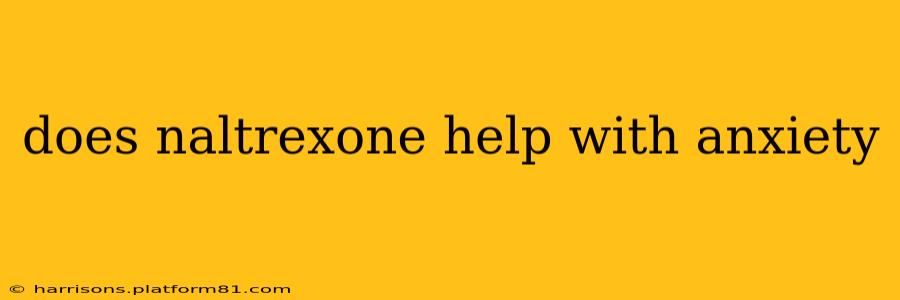Naltrexone, a medication primarily known for treating opioid addiction and alcohol dependence, has sparked interest in its potential to alleviate anxiety. While not directly approved for anxiety disorders, some studies suggest a possible indirect benefit. Understanding this complex relationship requires examining its mechanisms of action and considering individual responses. This article delves into the science behind naltrexone and its potential role in anxiety management.
How Does Naltrexone Work?
Naltrexone's primary mechanism involves blocking opioid receptors in the brain. Opioids, naturally occurring endorphins and externally sourced drugs like heroin and morphine, bind to these receptors, causing feelings of euphoria and pain relief. By blocking these receptors, naltrexone prevents the reinforcing effects of opioids, aiding in addiction treatment. However, this opioid receptor blockade has broader implications, potentially influencing other neurotransmitter systems involved in mood regulation.
Can Naltrexone Reduce Anxiety? The Evidence
The relationship between naltrexone and anxiety is not straightforward. While it doesn't directly target anxiety pathways like selective serotonin reuptake inhibitors (SSRIs), some studies suggest it might indirectly reduce anxiety symptoms in certain individuals. This potential effect may stem from:
- Impact on the Opioid System: Dysregulation of the opioid system has been linked to anxiety and mood disorders. By modulating this system, naltrexone might indirectly alleviate some anxiety symptoms.
- Effect on Reward Pathways: The brain's reward system is interwoven with anxiety pathways. Naltrexone's influence on reward mechanisms could potentially impact anxiety levels.
- Reduced Stress Response: Some research suggests naltrexone might dampen the stress response, leading to a reduction in anxiety.
It's crucial to note that the evidence supporting naltrexone's anxiety-reducing effects is limited and often based on small studies or anecdotal reports. More research is needed to fully understand its potential benefits and determine specific patient populations who might benefit.
Does Naltrexone Treat Anxiety Disorders?
No, naltrexone is not a treatment for anxiety disorders like generalized anxiety disorder (GAD), panic disorder, or social anxiety disorder. It's not approved by regulatory bodies like the FDA for this purpose. Individuals with anxiety disorders should consult a mental health professional for appropriate diagnosis and treatment. Therapy and/or medications specifically indicated for anxiety are generally recommended.
What are the side effects of Naltrexone?
Naltrexone can have side effects, including nausea, vomiting, headache, abdominal cramps, fatigue, and dizziness. These side effects are generally mild and temporary. However, severe side effects are possible.
Is Naltrexone Addictive?
Naltrexone itself is not considered addictive. However, it's crucial to use it as prescribed by a physician.
Can I take Naltrexone with other medications?
The use of naltrexone with other medications requires careful consideration. It's essential to inform your doctor about all medications you are currently taking, including over-the-counter drugs and supplements, to avoid potential drug interactions.
How is Naltrexone prescribed?
Naltrexone is typically prescribed by a physician specializing in addiction medicine or psychiatry. The dosage and treatment plan are individualized based on the patient's specific needs and medical history.
Disclaimer: This information is intended for educational purposes only and should not be considered medical advice. Always consult with a qualified healthcare professional for diagnosis and treatment of any medical condition, including anxiety. They can assess your specific situation, consider potential risks and benefits, and determine the most appropriate treatment plan for you. Self-treating can be dangerous.
